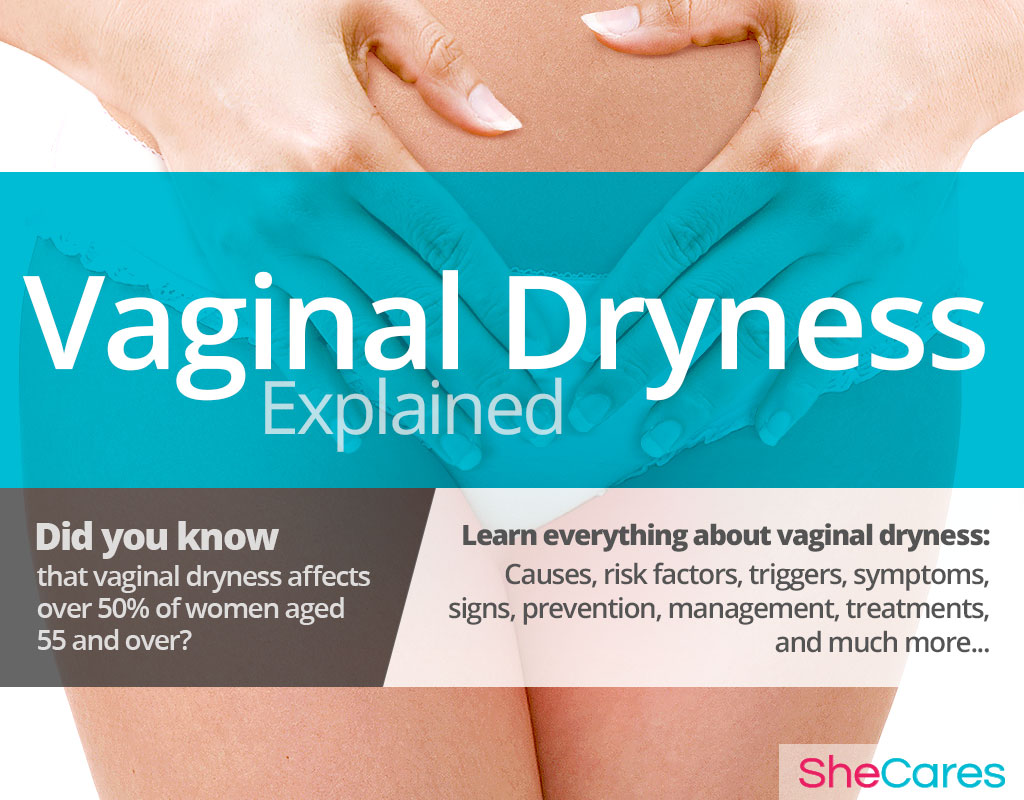About
What Is Vaginal Dryness?
Quick Facts about Vaginal Dryness
- Around 13.9 million U.S. women have experienced vaginal dryness.
- 87% of them find themselves at least “moderately bothered” by vaginal dryness.
- 40-60% of women experience vaginal dryness in menopause.
- 26 % of women aged 50 or over, and 12% of women under 40
Vaginal dryness is the lack of moisture in the vagina, which is oftentimes caused by hormonal imbalance, specifically of estrogen.
This means that it is much more likely to occur during PMS, as well as during the main stages of hormonal imbalance such as puberty, pregnancy, post-partum, and menopause. However, vaginal dryness is increasingly common as a woman gets older. The lining of the vagina gets drier and thinner, and loses its elasticity, due to a permanent decline in estrogen levels during menopause.
Vaginal dryness can have an impact on sexual health and fertility. Cervical mucus is important for maintaining a balanced pH level in the vagina, protecting the vagina from foreign bacteria, and helping sperm to reach the uterus. Therefore, when the vagina is not lubricated enough it increases the chances of catching a sexually transmitted disease, and decreases the chances of conception. Thus, it is vital for women to seek treatment options for this condition, to avoid the potential health complications that could arise if left untreated.
Identifying Vaginal Dryness
Although vaginal dryness is quite easy to identify, it is difficult to distinguish between the different gradations of this condition. Many women will experience some sort of vaginal dryness in their lifetimes, whether it be a cause of hormonal imbalance, or triggered by other factors such as insufficient arousal or using tampons. Vaginal dryness symptoms can vary in intensity and intermittency.
In order to understand the processes behind vaginal dryness, continue on to the next section to read about their hormonal and non-hormonal causes.
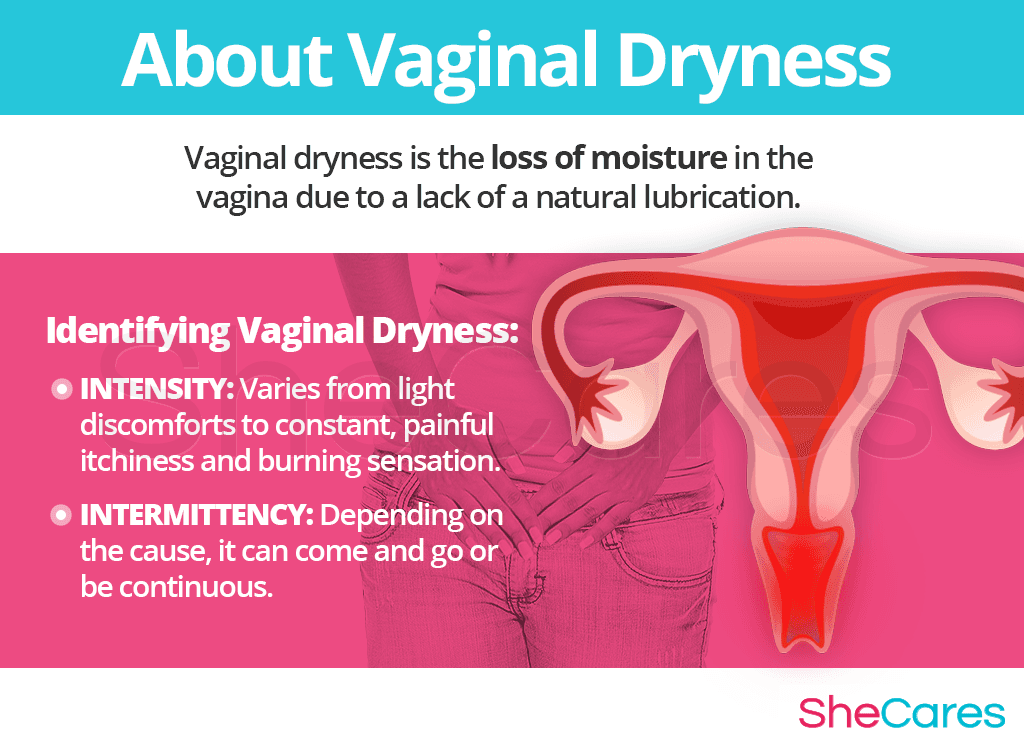
Causes
Learning about the causes of vaginal dryness provides the key to understanding how to prevent and treat these troublesome attacks. While the exact causes of vaginal dryness are complex and not completely understood, most doctors and researchers believe hormonal changes are the primary cause of vaginal dryness. In addition to these completely normal hormonal causes, other factors and medical conditions can, in more rare instances, cause vaginal dryness.
Continue reading to learn more about both the hormonal and additional causes of vaginal dryness.
Hormonal Causes of Vaginal Dryness
Hormones are chemical messengers that control every process in the body, so when changes in these hormone levels occur, certain health disorders can arise. Medical researchers have found that fluctuating levels of hormones, especially estrogen, make women more susceptible to vaginal dryness symptoms. Estrogen acts on the mucus membranes in the cervix (the neck of the womb) to produce cervical mucus, which lubricates the vagina and keeps it moist. When estrogen levels decrease, so do levels of natural vaginal lubrication, leading to vaginal dryness.
The reduced estrogen levels at certain points in the menstrual cycle and during stages of significant hormonal imbalance - puberty, pregnancy, post-partum, and menopause - cause the loss of the usual moistness and softness in the vagina, leading to vaginal dryness. In this sense, we can say that vaginal dryness is largely caused by the hormonal fluctuations during the changes women go through during their reproductive life.
These stages of reproductive life in which this disorder appears such as around PMS and during puberty, pregnancy, post-partum, and menopause are influenced by diverse hormonal changes. These, combined with other environmental factors, can have an impact on a woman's personal experience of vaginal dryness.
Hormonal Changes throughout a Woman's Life
PMS is a consequence of hormonal fluctuations linked to the menstrual cycle. Women may experience vaginal dryness symptoms at certain phases of their cycle due to hormonal changes.
Puberty is the stage in which a girl's body begins to produce reproductive hormones; these and other factors, such as using tampons, contribute to vaginal dryness during puberty.
Pregnancy leads to extreme changes in the production of reproductive hormones, which along with other factors, like anxieties about the baby, can lead to vaginal dryness.
Postpartum and breastfeeding is another stage where reproductive hormones are imbalanced, leading to symptoms like vaginal dryness. Also, other factors contribute to vaginal dryness in postpartum, like changes to the vagina after childbirth.
Menopause is the natural decline of reproductive hormones that signals the end of a woman's fertility. As well as hormonal causes, other factors add to the reasons for vaginal dryness during menopause, such as reduced libido.
Even though hormonal imbalance is the main cause of vaginal dryness throughout a woman's life, there are other causes that may be considered. Keep reading to learn about the other causes of vaginal dryness.
Other Less Common Causes of Vaginal Dryness
While hormonal imbalance is the major underlying cause of vaginal dryness during a woman's life, there are other factors which may cause vaginal dryness, such as cancer treatment, psychological factors, a yeast infection, or certain types of medication.
Keep reading to learn about the risk factors and triggers that could explain why some women are more prone to developing vaginal dryness than others.
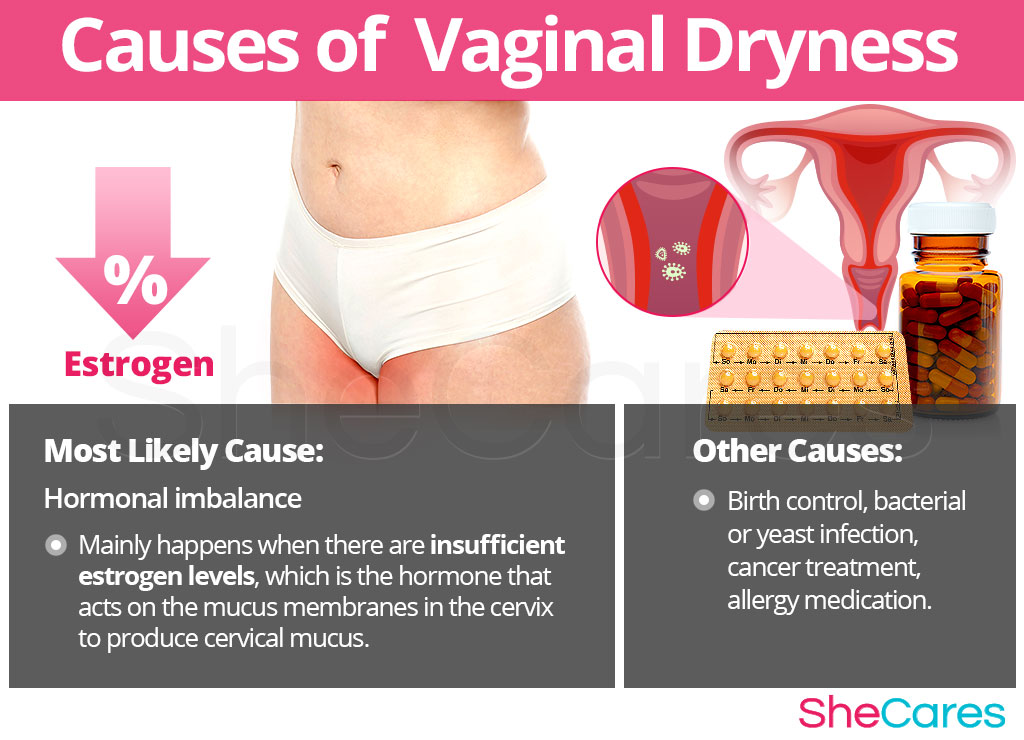
Risk Factors and Triggers
Risk Factors of Vaginal Dryness
There are very few risk factors for developing vaginal dryness. In general, all women experiencing hormonal imbalance are just as likely to develop these symptoms. However, women with risk factors such as genetic factors, or who have gone through a hysterectomy, may be more likely to suffer from vaginal dryness.
Triggers of Vaginal Dryness
Vaginal dryness can be triggered by environmental factors and behavioral habits, such as the use of strong-scented soaps and douching, as well as other external triggers. Avoiding these environments or habits may help to avoid vaginal dryness and its associated symptoms.
Now that all the causes and triggers have been explained, keep reading to discover the signs and symptoms of vaginal dryness.
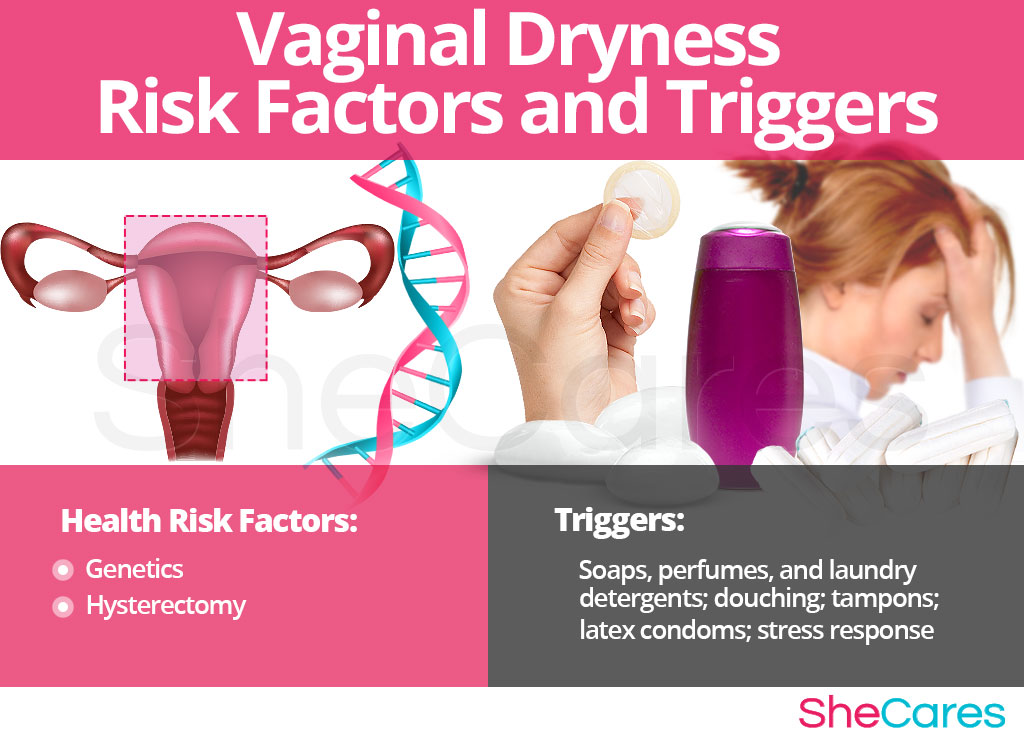
Signs and Symptoms
If any of the symptoms below are present, it is important to make an appointment with a doctor. Some women put up with vaginal dryness, because compared to other side effects of hormonal imbalance it is one of the least bothersome. However, the condition can have complications, and the treatments are so simple, that it is important to seek medical advice.
Symptoms of Vaginal Dryness
Vaginal dryness may cause any of the following:
- Itching or burning sensation in vagina or vulva
- Painful sexual intercourse
- Frequent urination
- Frequent urinary tract infections (UTI)
- Discomfort
Signs of Vaginal Dryness
These medical signs are can be assessed by a doctor. Symptoms of vaginal dryness are usually similar to a yeast infection, so these signs can be used to identify and diagnose vaginal dryness over another disorder.
- Lack of vaginal lubrication
- Dry, dark red-colored vagina lining
- Shorter and tighter vaginal canal (vaginal atrophy only)
Diagnosis of Vaginal Dryness
To diagnose and identify the symptoms of vaginal dryness, a doctor must typically perform a review of the patient's medical history, an assessment of her sexual history, a psychological assessment, and a physical exam.
Complications of Vaginal Dryness
Vaginal dryness can lead to many other complications. Most of these are just distant possibilities, such as a slightly higher risk of contracting an STD; however, others come as a direct consequence of vaginal dryness, when left untreated, such as vaginal atrophy in menopausal women.
Women who experience severe and frequent episodes of vaginal dryness should learn how to prevent their onset, and manage the condition if and when it arises. Continue reading to learn about the prevention and management of vaginal dryness.
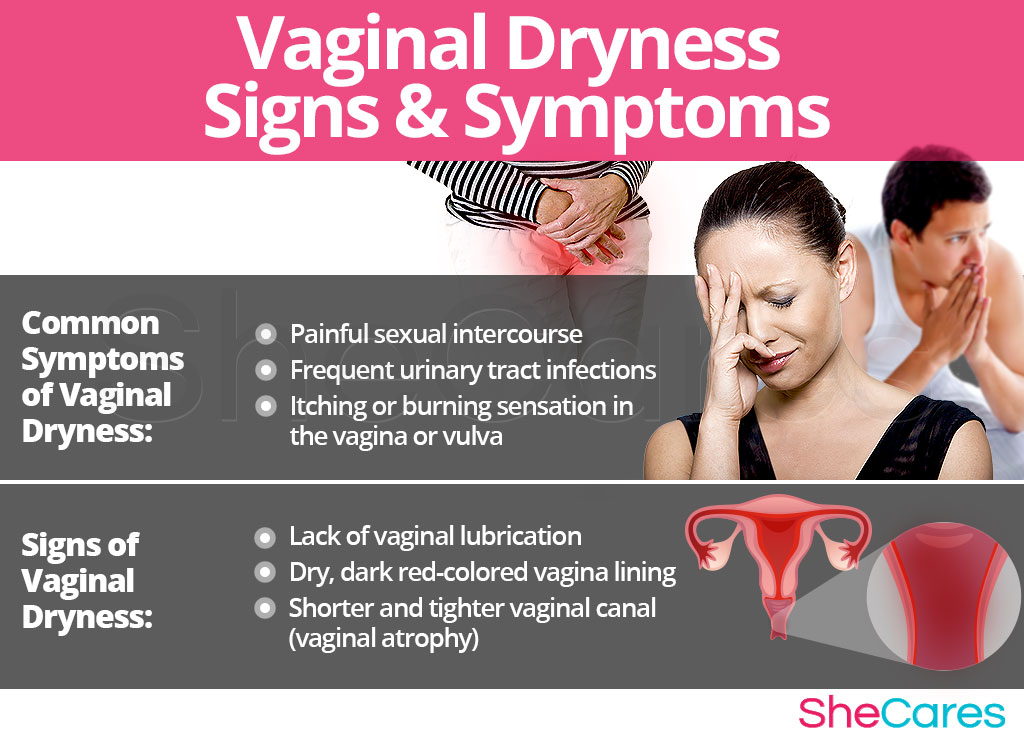
Prevention and Management
Preventing Vaginal Dryness
Vaginal dryness is one of the most frustrating side effects of hormonal imbalance, and its prevention and management is very important for the physical and emotional wellbeing of women of all ages.
While there is no medical way to prevent hormonal imbalances, and therefore vaginal dryness, from occurring, women who take the following preventative measures are less likely to develop symptoms of vaginal dryness in the future.
Lifestyle changes form the basis of vaginal dryness prevention measures, including changes in diet, habits, and exercise. Supplements complement these lifestyle approaches, maximizing the efficacy of the endocrine system in order to help prevent or manage the symptoms of vaginal dryness caused by hormonal imbalances.
If a woman is already suffering from an episode of vaginal dryness, or from vaginal atrophy, then learning how to manage this condition may help reduce the severity of the symptoms. Continue reading to learn about management strategies for vaginal dryness.
Managing Vaginal Dryness
Vaginal dryness is one of the most frustrating symptoms of hormonal imbalance to deal with, but there are a surprising number of little changes that women can make to their lives to reduce the itching, burning, and painful feeling, and to reduce complications from arising. These general tips, such as switching laundry detergent or wearing cotton underwear, will make a huge difference to women of all ages' experience of vaginal dryness.
Alternative Management Tips for Vaginal Dryness
One other way of reducing vaginal dryness symptoms is by turning to alternative treatments. Although these do not tackle the hormonal cause of vaginal dryness, they could be effective in relieving or preventing this condition. Alternative treatments include acupuncture and biofeedback.
While these options may help to provide some short-term relief for vaginal dryness, they may not totally eradicate the problem. However, several natural treatment options are available to treat the hormonal imbalance at the root of this condition. Keep reading to discover what treatments exist for vaginal dryness.
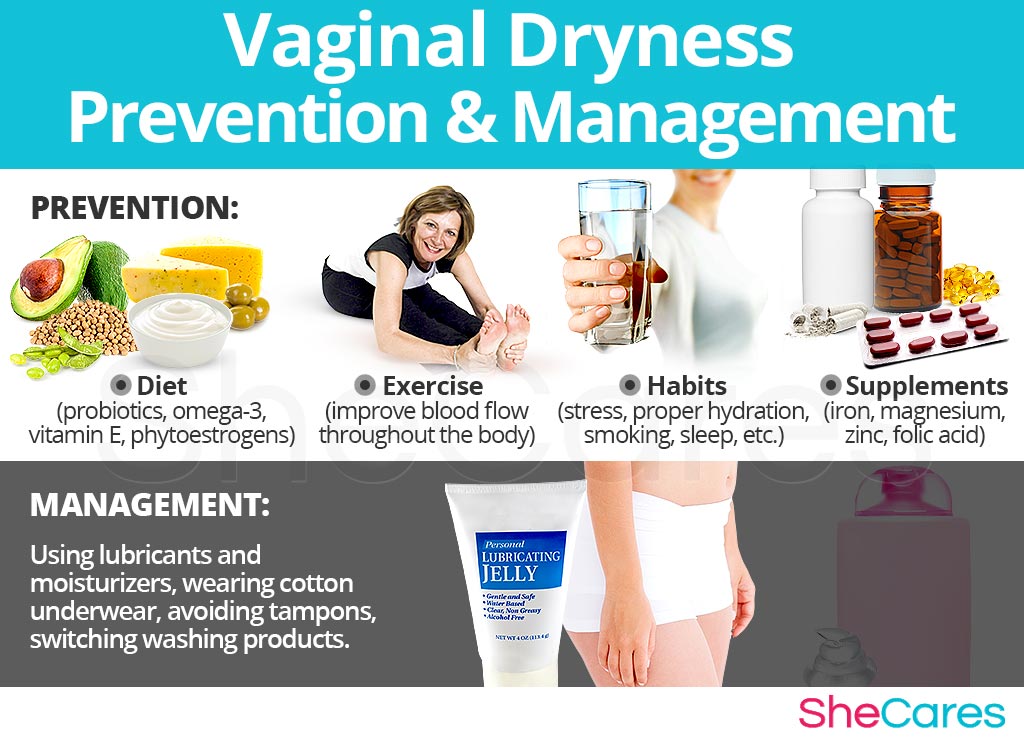
Treatments
Many women who suffer from vaginal dryness do not seek treatment for the condition, because they think that there will be no cure. Fortunately, there are many possible effective treatment options for vaginal dryness, and these can be categorized into three approaches.
Three Approaches to Treat Vaginal Dryness
Three levels of approaches can be considered for treating vaginal dryness. These are categorized as: (1) Lifestyle Changes, (2) Alternative Medicine, and (3) Pharmaceutical and Surgical Options.
Vaginal dryness is mainly caused by reduced estrogen levels, so it is vital to ensure that the endocrine system is in great shape to be able to battle this condition. Women are encouraged to begin with the least risky approach to vaginal dryness treatment, lifestyle adjustments, and then proceed to alternative medicine. While medical intervention is not usually necessary to treat vaginal dryness, women who are unable to find relief from natural treatments may wish to consider pharmaceutical options, after properly assessing the risks associated with such a treatment.
Lifestyle Changes for Vaginal Dryness
This primary level of treatment involves the least amount of risk, though conversely it requires the highest amount of self discipline. Often simple changes in lifestyle can reap huge benefits in fighting vaginal dryness, and achieving a higher overall level of health. Fundamentally, an improved diet, regular exercise, and healthy habits can do a woman great service.
Alternative Medicine for Vaginal Dryness
Alternative medicines and supplements involve little to no risk and can be an extremely effective way to treat vaginal dryness. In the case of herbal supplements, there are two main types that can be used: phytoestrogenic and hormone-regulating herbal supplements.
Phytoestrogenic herbal supplements
These supplements, such as black cohosh, contain estrogenic components produced by plants that complement the low estrogen hormones in a woman's body, helping alleviate vaginal dryness. By introducing plant-based estrogens into the body, these herbs treat the underlying hormonal imbalance behind vaginal dryness.
They are mainly effective for menopausal women who are more likely to have low estrogen levels but are not necessarily effective for women in other stages of life such as puberty.
Hormone-regulating herbal supplements
These supplements, including Macafem stimulate the body's natural hormone production by nourishing the pituitary and endocrine glands, helping the whole hormonal system produce hormones more efficiently. This ultimately results in balancing not only estrogen but other important hormones such as progesterone.
These supplements can be considered the safest and most natural way to treat the underlying hormonal imbalance behind vaginal dryness, and can be taken throughout a woman's life, as they support the body's natural hormone production.
Additionally, there are some other types of supplements that can also alleviate vaginal dryness, or at least make them more manageable, including vitamins and other herbal supplements.
For most women, a combination of lifestyle changes complemented by alternative medicine will provide the relief sought from vaginal dryness. However, some women may feel that they want or need to resort to a medical approach.
Pharmaceutical and Surgical Options for Vaginal Dryness
Interventions at the third level involve the highest risk and often the highest costs. Not all treatments are suitable for women at every life stage, so it is strongly recommended to speak to a licensed healthcare practitioner before starting any pharmaceutical treatments for vaginal dryness.
There are two main types of pharmaceutical options that can be prescribed to treat vaginal dryness: hormone-regulating medication and other medication. Women who have reached menopause and are suffering from vaginal atrophy also have surgical options available.
These three approaches are not mutually exclusive. Women may want to use a combination of treatments for vaginal dryness symptoms at different periods of her life, depending on what works for her. More and more women are finding that the best way to banish vaginal dryness is via a combination of lifestyle changes and alternative medicine.
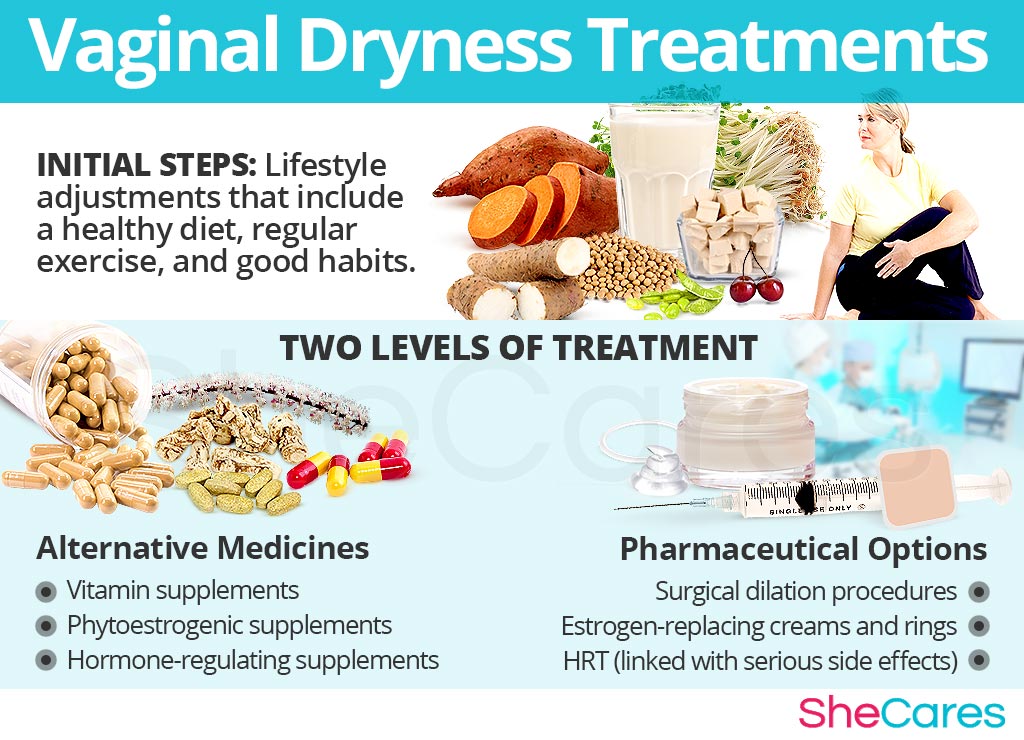
Sources
- MenopauseNow. (2017). Vaginal dryness. Retrieved August 22, 2017, from https://www.menopausenow.com/vaginal-dryness
- Mayo Clinic. (2012). Vaginal dryness. Retrieved January 31, 2013, from http://www.mayoclinic.com/health/vaginal-dryness/DS0055
- Mayo Clinic. (2012). Vaginal atrophy. Retrieved January 31, 2013, from http://www.mayoclinic.com/health/vaginal-atrophy/DS00770
- Kenny, T. & Willacy, H. (2012). Atrophic Vaginitis (Vaginal Dryness). Retrieved January 31, 2013, from http://www.patient.co.uk/health/atrophic-vaginitis-vaginal-dryness
- National Health Service UK. (2016).Vaginal dryness. Retrieved August 22, 2017, from http://www.nhs.uk/Conditions/dry-vagina/Pages/Introduction.aspx
